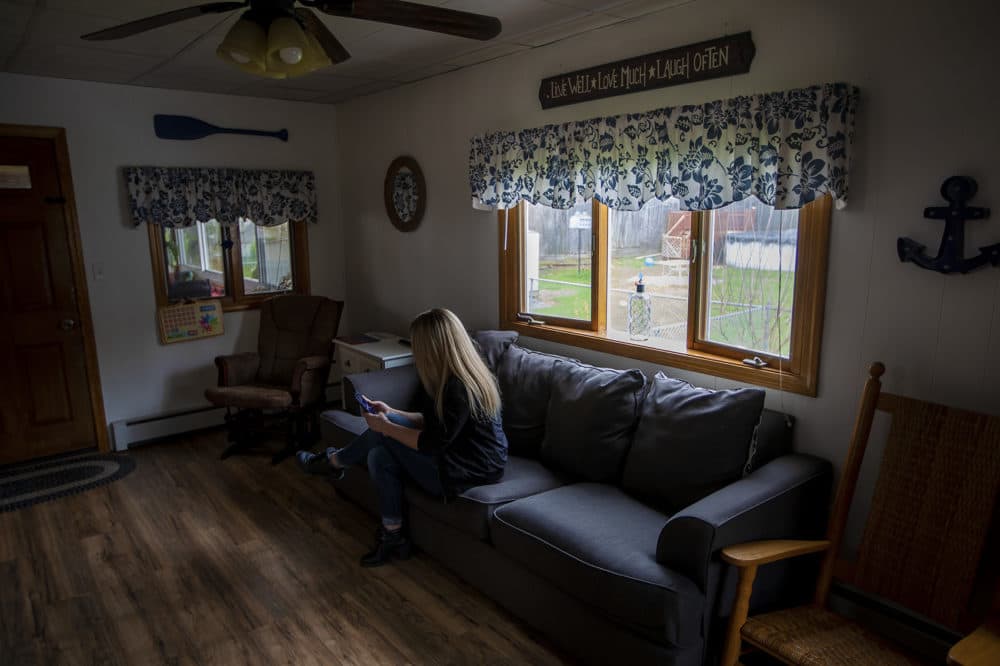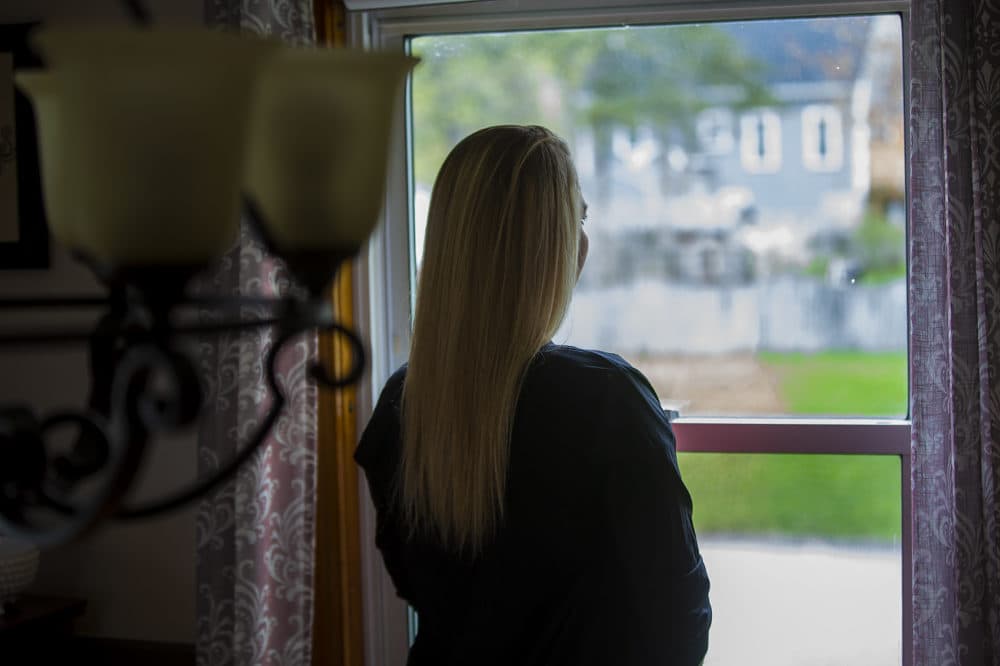Advertisement
'I Just Wanted Out Of That Van': Mass. Woman Claims Sexual Assault By Private Transport Guard
Resume
Editor's note: This story includes a description of alleged sexual assault.
It was Smith's 12th day in the van. She wore the same dirty clothes she'd put on almost two weeks earlier at a rehab facility in California, where she was arrested on a probation warrant out of Massachusetts.
She sat hunched in a compartment near the front of the van, called the birdcage, inches away from a handful of other detainees, all men, who she says made lewd comments and tried to stick their fingers through the grate to touch her. Men urinated in bottles between the infrequent bathroom stops.
It didn’t seem like things could get worse.
Then, at a stop in southern New Jersey, 350 miles from her home in Massachusetts, one of the guards pulled Smith aside, out of view of the rest of the detainees and the other guard. She was handcuffed at the waist, shackled at the feet, when she says he slipped his hand under her waistband.
"It was just probably the most demeaning, degrading thing that's ever [been] done to me like that, in a situation where I really can't do anything about it," Smith says. "And so at that point I was just mentally beaten."
"[A]t that point I was just mentally beaten."
Smith is her last name; WBUR doesn’t fully identify victims of sexual assault without their consent. The guard is now facing criminal sexual assault charges in New Jersey. Smith has also filed a federal lawsuit against the guard and his employer, Nashville-based Prisoner Transport Services of America, or PTS, seeking unspecified damages.
Smith was arrested and brought back to Massachusetts after violating her probation and traveling to southern California, where she says she went for drug treatment.
State employees don't typically move probation violators across the country. Instead, Massachusetts, like many other states, contracts that job to private prison transport companies like PTS.
The Massachusetts Probation Service has tapped PTS to move more than 460 adults since 2015. PTS and its subsidiaries collected more than $1.3 million in the last 10 years from Massachusetts, mostly from the probation and parole departments.
PTS says it will move 26,000 detainees more than 6 million miles this year.
"We go the extra mile to ensure staff and detainee safety every step of the way," the company says on its website.
Concerns Raised About PTS Before
The harrowing journey Smith described is not unique.
A report from the New York Times and the Marshall Project in July 2016 — several months after PTS had custody of Smith — detailed deaths on the vans, and sexual assault, abuse and neglect committed by PTS guards. At least five people have died on PTS extradition vans since 2012, the Marshall Project reports.
Reports like those led Massachusetts U.S. Sen. Elizabeth Warren and two of her congressional colleagues to demand answers from PTS. In a February 2019 letter to PTS’ president, the members of Congress requested information about how the company keeps detainees safe, as federally required. They also asked how many detainees in PTS custody have died, or been injured or sexually abused.

In response, PTS’ president, Joel Brasfield, didn’t say how many people have been hurt or abused in the company’s care. Instead he wrote that "[t]ransporting prisoners is an inherently difficult business" and detailed how PTS has “taken a leadership role in attempting to improve the industry standards of prisoner transportation.” He listed several “best practices” PTS encourages governments to include in contracts.
Some of those best practices could have benefited Smith — like at least three working video cameras, heating and air conditioning, and more segregated detainee seating.
It's not clear that Massachusetts has required any of those best practices in its transportation bids. In its request for bids last year, probation only specified that detainee transport companies must comply with federal laws, be available 24/7, and “accommodate special needs offenders” who have medical, physical or psychological needs.
Brasfield and PTS didn’t respond to multiple requests for comment from WBUR.
Massachusetts officials with both the probation department and the Executive Office of Public Safety and Security — which oversees the parole department — declined to comment on the use of PTS, citing Smith’s civil lawsuit, even though no state agencies or officials are named in it.
And the civil attorney representing both PTS and the guard refused to answer questions when approached by a WBUR reporter at a hearing for the guard’s criminal case in New Jersey last month. (Because PTS did not reply to WBUR, it's unclear if the guard is still with the company.)
The Alleged Assault
Smith shouldn’t have been in Los Angeles in the first place. She was on probation, after serving time in Massachusetts on charges that she took a police officer’s gun from his closet at home. She ultimately pleaded guilty to theft of and illegal possession of a firearm, and was sentenced to 18 months in jail and three years probation.
Since leaving jail in 2014, Smith says she's struggled with an opioid addiction. And flipping through the channels one night in 2015, she came across an ad.
"I was actually watching TV one night and a commercial came on and it was one of those, 'Do you or a loved one need help with substance use?' or something like that, and so I called the phone number and literally I was on a plane the next day," Smith says.
She spent six weeks there, sober for the first time in a while. She says she talked regularly with her probation officer back in Massachusetts, telling her where she was and asking about transferring her probation out to California. She says the probation officer seemed happy she was doing well. (The department declined to comment.)
Everything seemed fine — until U.S. Marshals showed up in December. They arrested her on a warrant for failing to appear for a probation violation hearing.
"He put me into this van. And there were just these people in the backseat — men — and they're like ... 'Get ready for the trip from hell.' "
Smith
She spent Christmas in the LA county jail. And on New Year’s Day, a PTS van showed up to take her back to Massachusetts. They gave her the clothes she had been wearing at the rehab center — a thin T-shirt, jeans and boots — to put back on.
"He put me into this van," Smith recalls. "And there were just these people in the backseat — men — and they're like, 'We've been in here for days.' They were like, 'Get ready for the trip from hell.' "
She had no way to call home to her mom, or speak to her son. She obsessed over where they were, and the time — checking the green numbers of the digital clock on the dashboard. She kept track of what state they were in — Nevada, back to California, Arizona, New Mexico, Oklahoma, Texas, West Virginia.
She felt the temperatures drop, and spike, as they drove from desert to cooler climates. Condensation dripped from the ceiling of the van, soaking the white T-shirt she had on, the same clothes she’d left LA in.
There were few stops in the van between pickups. The men in the van urinated in bottles, Smith says. She couldn’t do that, and eventually stopped drinking water so she wouldn’t have to pee.
Days passed. Then a week. She spent three days at a holding facility in Kentucky, waiting on a new pair of PTS guards to pick her and other detainees up. That’s when Officer Jermaine Taylor and his partner took over.
On day 12, they stopped in Atlantic City to drop off a detainee. Smith says Taylor complained about the trash in the back of the van — McDonald’s bags, empty water bottles. He demanded one of the detainees clean everything up.
"As this one younger kid goes in to start cleaning the back of the van," she says, "Officer Taylor has his hands in between my legs outside of my jeans and he was just kind of like, touching like the inside of my thighs."
Smith says Taylor had her at the side door, at the entrance to the birdcage. The men couldn’t see her. Smith’s hands were cuffed to her waist, her legs shackled.
"And then he takes his hand and he moves it up to my waist and he puts his hand down my pants and is like rubbing my vagina and then takes his finger and sticks it inside my vagina as he is directing this kid in the backseat to pick up trash."
"I couldn't jump out of the van. I couldn't fight an officer ... because I was an inmate and I just, I’m in their custody … I was scared of the fact that I didn’t want to do the wrong thing," she says. "So I just didn’t do anything and then he took his hand out and he closed the door and he got back in the front.”
She still had two more days until she’d be out of the van.
After that, Taylor seemed emboldened, Smith says. When they stopped at a gas station, he got her a cookie and offered it to her.
Through the Plexiglas, she could see Taylor scrolling on his phone. She says he pulled up her Facebook page, clicked through to photos of her 5-year-old son. Already uncomfortable and scared, it unsettled her even more.
"I just wanted to get out of that van," she says. "That's the only thing I wanted to do was to get out of the van because I knew I couldn't say anything to anyone on the van."
An Upcoming Trial

Finally, on day 14, they pulled into a jail in Middleton, Massachusetts. The guards unloaded Smith. Taylor wasn’t done with her, though.
She says he handed her a piece of paper with his name and phone number on it. Taylor told her they could “finish what they started,” according to a description in the police report.
"So I immediately put it in my pocket, got in, [and] as soon as I saw the sally port door close shut, I just asked to talk to a female officer," Smith says.
She told an officer what happened. That led to a trip to the hospital, a rape kit while still shackled, an interview with a detective and finally, almost a year later, charges against Taylor in Atlantic County, New Jersey.
Last month, he was supposed to go on trial. Smith and Taylor were both at the courthouse in Atlantic City. But a last-minute delay pushed the trial to August.
Taylor has pleaded not guilty. His defense attorneys declined to comment, as did the Atlantic County prosecutor's office.
Smith says she’ll be there in August.
"It's just going to be another one of the doors I have to walk through," she says.
It’s been more than three years since Smith's journey from LA to Massachusetts. She went back to rehab and says she's off drugs. She's no longer on probation, and she's now a college student, studying psychology. She lives with her mom, her sister and her now-8-year-old son.
She wants to see Taylor held accountable for what she says he did — and for other detainees to be treated better than she was.
"I think it’s horrific that the state of Massachusetts paid thousands of dollars for me to sit on a van for 14 days and then be sexually assaulted," she says. "Just because you're put in a van and called an inmate doesn't take away your humanity."
Resources: You can reach the National Sexual Assault Hotline at 800-656-HOPE (4673). You can also visit online.rainn.org to receive support via confidential online chat.
This segment aired on May 6, 2019.
